Mixing risperidone and alcohol might seem harmless-just a drink after dinner, maybe to help you unwind. But if you’re taking risperidone for schizophrenia, bipolar disorder, or irritability linked to autism, that drink could be more dangerous than you think. The combination doesn’t just make you feel worse-it can trigger serious, even life-threatening reactions. This isn’t about being told to quit drinking. It’s about understanding what’s really happening inside your body when these two substances meet.
How Risperidone Works in Your Brain
Risperidone is an atypical antipsychotic. It doesn’t make you feel high or numb. Instead, it balances chemicals in your brain-mainly dopamine and serotonin-to reduce hallucinations, delusions, and extreme mood swings. People taking it often report feeling more in control, less anxious, and better able to focus. But that balance is fragile. Risperidone works slowly, building up in your system over days or weeks. Your body gets used to its presence. Introducing alcohol disrupts that delicate process.
What Alcohol Does to Your Central Nervous System
Alcohol is a depressant. It slows down your brain’s communication pathways. That’s why you feel relaxed, drowsy, or even clumsy after a few drinks. But when you’re on risperidone, your nervous system is already being gently suppressed. Alcohol doesn’t just add to that-it multiplies it. The result? Excessive drowsiness, confusion, dizziness, and trouble standing or walking. One study from the Journal of Clinical Psychopharmacology found that patients who drank while on risperidone were nearly three times more likely to experience falls or accidents than those who didn’t.
The Real Risks: More Than Just Feeling Tired
Some people think, “I’ve had a beer with my pills before and nothing happened.” That’s not proof it’s safe-it’s luck. The danger isn’t always immediate. It builds up. Here’s what can happen when you mix the two:
- Severe drowsiness-so intense you might pass out, especially if you’re also taking other sedatives like benzodiazepines or sleep aids.
- Low blood pressure-risperidone can already lower blood pressure. Alcohol makes it drop even further, causing fainting, especially when standing up quickly.
- Impaired motor control-your coordination worsens. This isn’t just awkward walking; it increases the risk of serious injury from slips, falls, or car accidents.
- Worsened psychiatric symptoms-alcohol can trigger or intensify depression, anxiety, or suicidal thoughts, which risperidone is meant to treat.
- Reduced effectiveness-your body may metabolize risperidone differently when alcohol is present, leading to unpredictable drug levels in your blood.
In extreme cases, the combination has led to respiratory depression-where breathing slows to dangerous levels-and even coma. The FDA has issued warnings about this interaction since at least 2012, and it’s still overlooked by many patients and even some doctors.
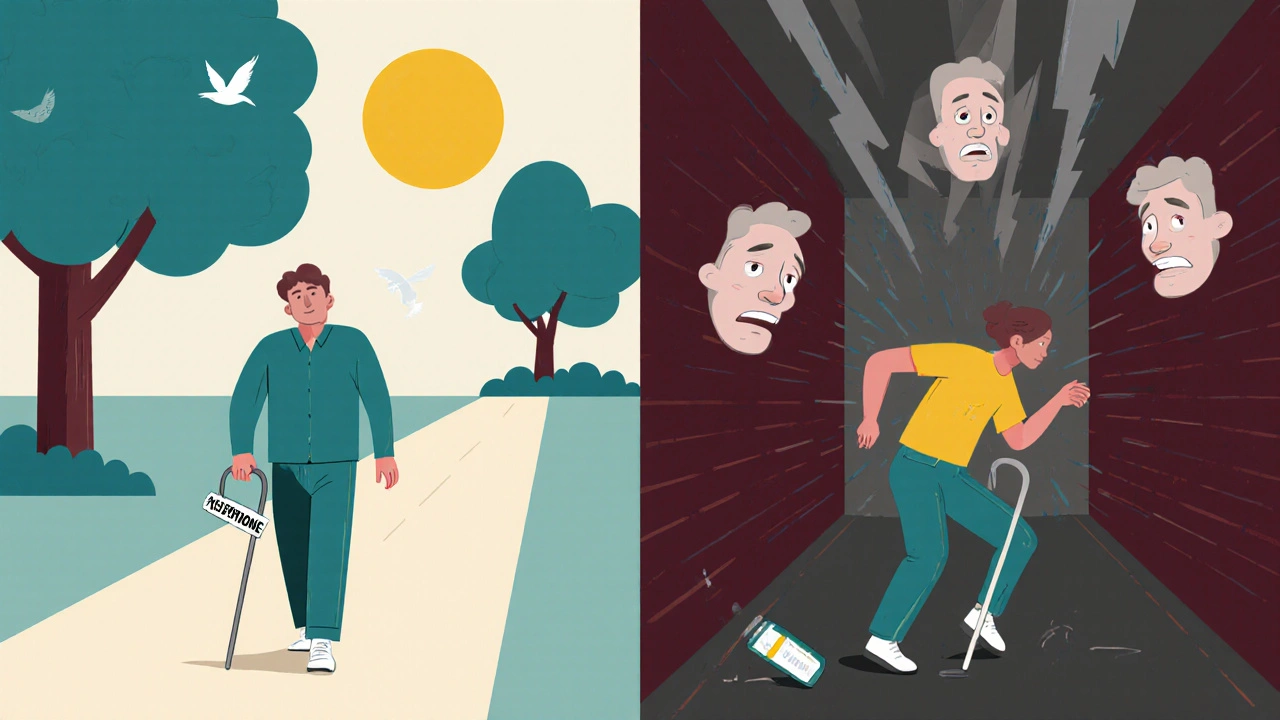
How Much Alcohol Is Safe?
There isn’t one. Even one drink can be risky. The American Psychiatric Association advises complete abstinence from alcohol while taking antipsychotics like risperidone. Why? Because there’s no safe threshold established-and everyone reacts differently. Your weight, liver function, age, and other medications all change how your body handles the mix.
Some people might feel fine after one glass of wine. Others feel dizzy after half a beer. That unpredictability is the real danger. It’s not worth testing. If you’re on risperidone, your brain is already working harder to stay stable. Alcohol throws that system into chaos.
What If You’ve Already Mixed Them?
If you’ve had a drink while taking risperidone and feel unusually sleepy, confused, lightheaded, or nauseous, don’t wait. Sit down. Don’t drive. Call someone you trust. If you’re having trouble breathing, your heart is racing, or you’re losing consciousness, seek emergency help immediately. These aren’t normal side effects-they’re warning signs.
Even if you feel okay, it’s still important to talk to your prescriber. They may want to check your blood levels, adjust your dose, or monitor you for delayed reactions. Many people don’t report these incidents out of fear or shame. But your doctor isn’t there to judge-they’re there to keep you safe.
Alternatives to Alcohol for Relaxation
You don’t have to give up all ways to relax. Many people on risperidone find healthier ways to unwind:
- Low-impact exercise like walking, yoga, or swimming helps reduce stress and improve sleep.
- Mindfulness practices-breathing exercises, meditation apps, or journaling-can calm the nervous system without chemicals.
- Herbal teas like chamomile or passionflower are generally safe and can help with anxiety (but always check with your doctor first).
- Connecting with supportive friends or therapy groups gives emotional relief without physical risk.
These aren’t just “good ideas.” They’re tools that work with your medication, not against it.
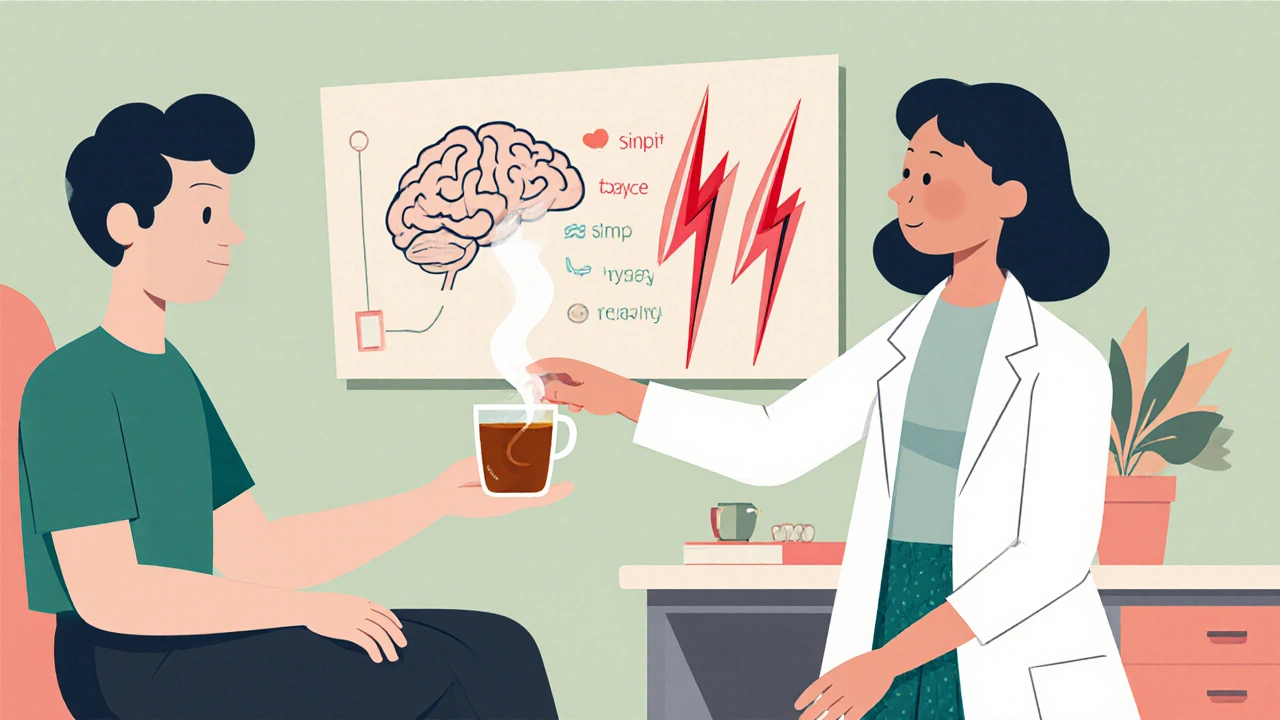
What Your Doctor Should Tell You
Too often, patients are handed a prescription for risperidone with a pamphlet and told to “take it as directed.” The warning about alcohol is rarely mentioned clearly-or at all. If your doctor didn’t bring it up, ask. Say: “I want to know if alcohol is safe with this medication.” That’s your right.
Good prescribers will:
- Explain the interaction in plain language, not medical jargon.
- Ask about your drinking habits without judgment.
- Offer alternatives or support if you’re trying to cut back.
- Document the warning in your chart so other providers see it.
If you feel dismissed or rushed, find a provider who treats your mental health as seriously as your physical health.
Real Stories, Real Consequences
Mark, 42, from Edmonton, started risperidone for bipolar disorder. He had one beer every night to help him sleep. After three weeks, he passed out on his porch in the cold. He woke up with frostbite on his fingers. His doctor later told him the alcohol had masked his dizziness until it was too late. He hasn’t had a drink since.
Sarah, 28, took risperidone for psychosis and drank socially on weekends. She started forgetting conversations, zoning out during meetings. Her dose was increased, thinking she needed more medication. It wasn’t until she told her therapist about the weekend drinking that they realized the alcohol was making her symptoms worse.
These aren’t rare cases. They’re predictable outcomes of an under-discussed risk.
Final Advice: Don’t Guess. Ask.
Medications like risperidone are powerful. They help people live fuller, more stable lives. But they’re not meant to be mixed with substances that depress the nervous system. Alcohol isn’t the enemy-it’s a trigger. And triggers are avoidable.
If you’re on risperidone:
- Assume alcohol is unsafe unless your doctor says otherwise.
- Don’t rely on how you felt after one drink. That’s not a test-it’s a gamble.
- Keep a journal: note what you drink, when, and how you feel afterward. It helps your doctor spot patterns.
- Reach out if you’re struggling to cut back. Support groups, counseling, and medication-assisted treatment exist for a reason.
Your brain is already doing hard work. Don’t make it harder.
Can I have one drink while taking risperidone?
No. Even one drink can increase drowsiness, lower blood pressure, and impair coordination. There’s no proven safe amount. The risk isn’t worth it, especially since risperidone affects your brain’s ability to process alcohol normally.
How long after stopping risperidone can I drink alcohol?
Risperidone stays in your system for about 3 to 4 days after your last dose. But if you’ve been taking it long-term, your brain chemistry may still be adjusting. Wait at least a week after stopping, and only drink after talking to your doctor. Never restart risperidone while drinking.
Does alcohol make risperidone less effective?
Yes. Alcohol can interfere with how your liver breaks down risperidone, leading to either too much or too little of the drug in your blood. This can make symptoms return or worsen. It also increases side effects like weight gain and movement disorders.
Can alcohol cause psychosis in someone taking risperidone?
Alcohol doesn’t directly cause psychosis, but it can trigger or worsen symptoms in people with conditions like schizophrenia or bipolar disorder. For someone on risperidone, drinking may lead to hallucinations, paranoia, or mood crashes that weren’t present before.
What should I do if I accidentally mixed risperidone and alcohol?
If you feel dizzy, extremely sleepy, confused, or have trouble breathing, seek medical help immediately. If you feel fine, still contact your doctor. They may want to monitor your vitals or adjust your medication. Never ignore the interaction just because you didn’t feel bad right away.
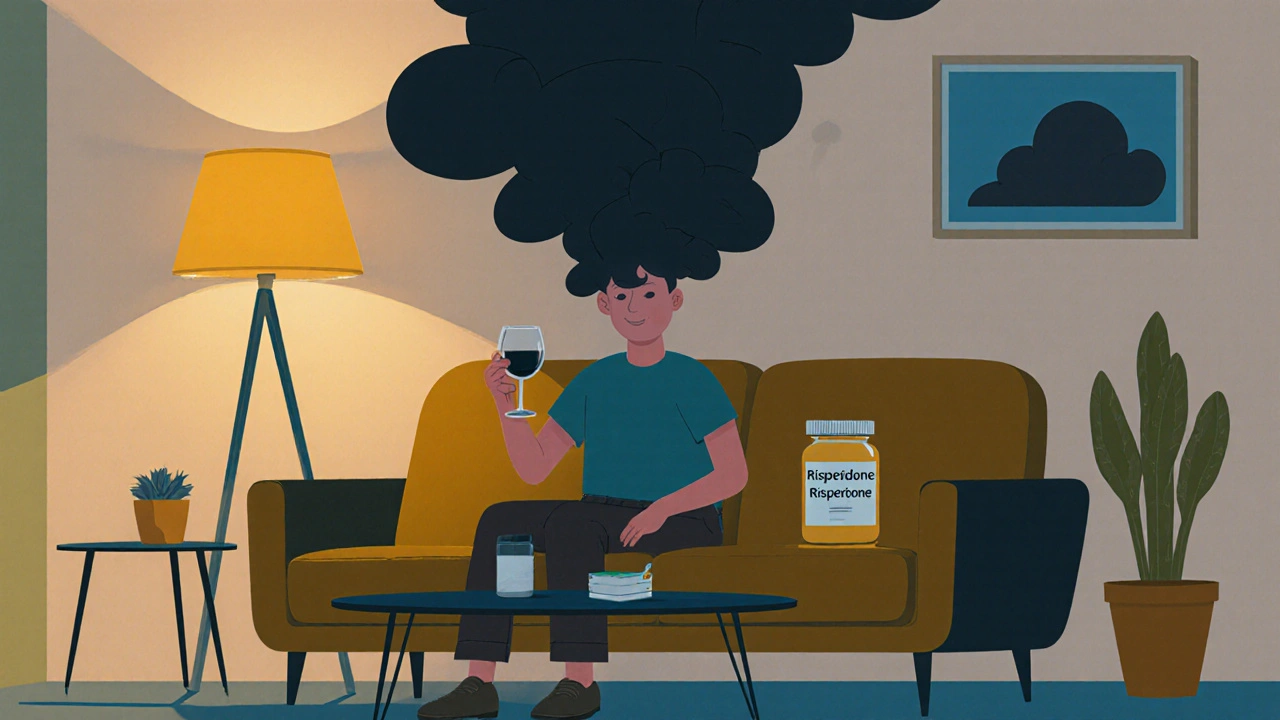

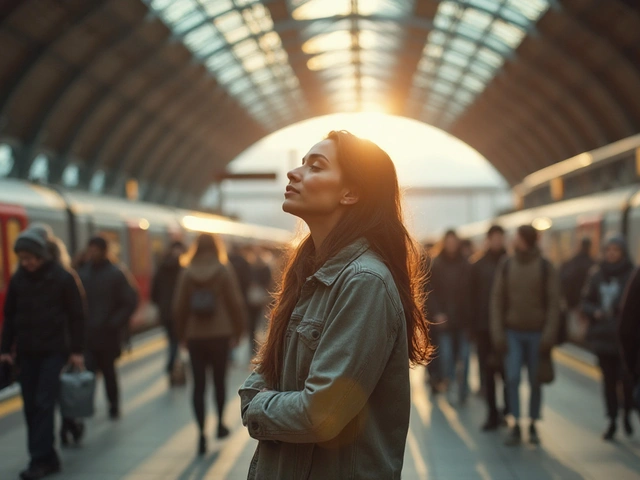
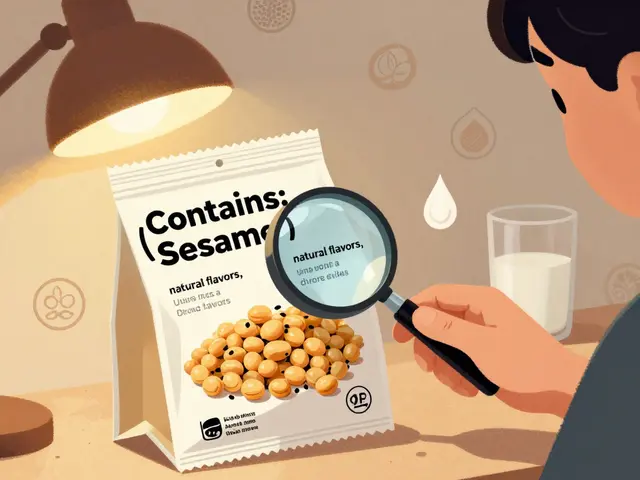
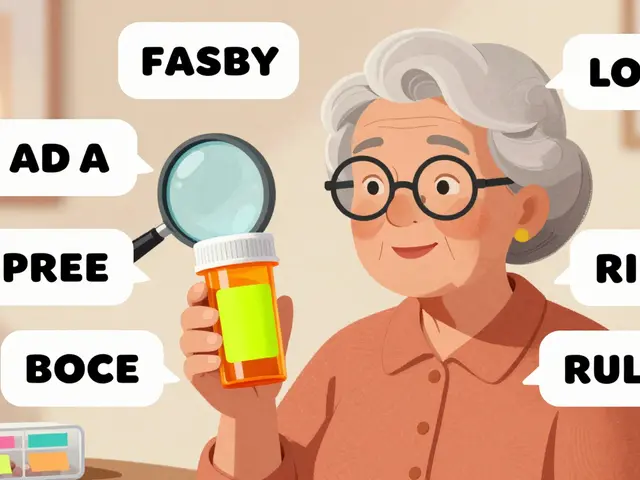
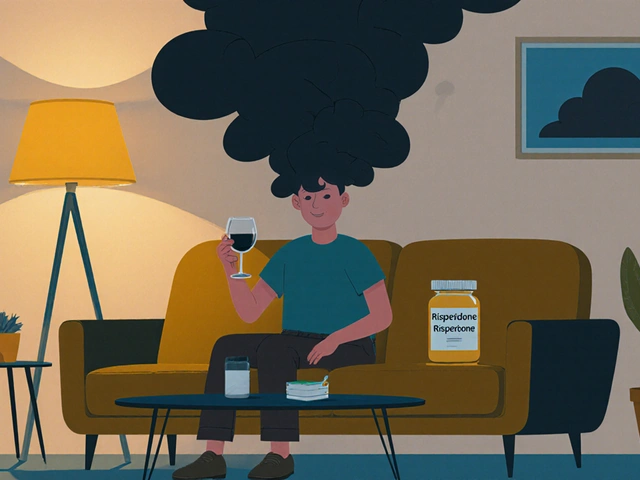
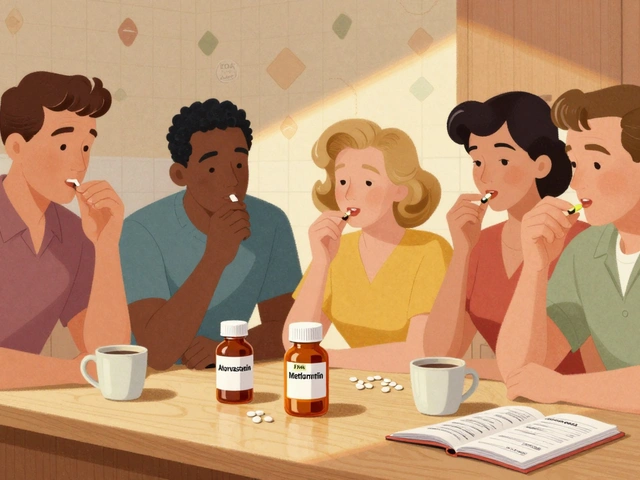
jackie cote
28 October 2025 - 17:16 PM
Alcohol and risperidone is a dangerous combo. No exceptions. I’ve seen too many people think they’re fine until they’re not. Your brain is already working overtime. Don’t sabotage it with a drink. Period.
ANDREA SCIACCA
28 October 2025 - 21:35 PM
YOOOOO WHY DO PEOPLE THINK THEY CAN JUST ‘CHILL’ WITH PSYCH MEDS??? 🤯 Like bro it’s not a beer and pizza night it’s your NEUROCHEMISTRY ON FIRE 🔥 I mean come on the FDA warned us like a DECADE ago and still people are out here sippin’ wine like it’s a yoga retreat 🙃
Camille Mavibas
30 October 2025 - 17:06 PM
So true 😔 I used to have one glass of wine to unwind… then I’d zone out for hours. My doc finally said ‘stop.’ I switched to chamomile tea 🌼 and honestly? Better sleep, less brain fog. You don’t need alcohol to relax. You just need to be kind to yourself 💛
Shubham Singh
30 October 2025 - 20:00 PM
You people are naive. This isn’t about ‘being safe.’ It’s about control. The system wants you docile. Alcohol is freedom. Risperidone is chains. Mixing them? That’s rebellion. And rebellion has consequences. I’ve seen it. I’ve lived it. You think you’re just drinking? You’re fighting a war inside your skull.
Hollis Hamon
31 October 2025 - 05:42 AM
I appreciate how clear this post is. It’s rare to see someone explain the science without fear-mongering. I’ve been on risperidone for five years. I stopped drinking cold turkey after a fall that landed me in the ER. No regrets. My stability is worth more than any drink.
Adam Walter
1 November 2025 - 00:47 AM
Let’s get real: alcohol doesn’t just ‘interfere’ with risperidone-it hijacks the entire neurochemical orchestra. Dopamine modulation? Thrown off-key. Serotonin balance? Now a cacophony. Liver enzymes? Overworked. Blood pressure? Plummeting like a dropped phone. And let’s not forget the ‘phantom dizziness’-that creeping, ‘I’m fine but my legs forgot how to work’ sensation. It’s not ‘just tired.’ It’s your CNS screaming for mercy. And no, ‘one drink’ isn’t a test-it’s Russian roulette with your frontal lobe.
Gurupriya Dutta
1 November 2025 - 12:07 PM
I’ve been on risperidone for three years. I never drank before starting it, but I wondered if maybe one drink on weekends was okay. After reading this, I realized I didn’t even need to ask. My mind feels clearer than it has in years. Why risk that? I’m grateful for the clarity. No alcohol needed.
Michael Lynch
2 November 2025 - 02:10 AM
I used to think I was the exception. One beer. Just one. But after a few months, I started zoning out in conversations. My partner noticed. I didn’t. That’s the scary part-it sneaks up. Now I drink sparkling water with lime and call it a victory. No drama. Just peace.
caroline howard
3 November 2025 - 20:13 PM
Oh honey, you ‘just had one glass’? 😏 Sweetie, your brain isn’t a cocktail mixer. It’s a high-precision instrument. And you’re not bartending-you’re playing Jenga with your sanity. Congrats on the frostbite, Mark. Truly inspiring.
Melissa Thompson
5 November 2025 - 12:02 PM
As someone who has read the FDA’s official documentation, studied pharmacokinetics, and reviewed the 2012 Drug Safety Communication-let me be perfectly clear: this is not a suggestion. It is a medical imperative. Anyone who claims ‘I’m fine’ is either in denial or dangerously misinformed. You’re not special. You’re not immune. You’re just lucky… so far.
Rika Nokashi
6 November 2025 - 12:31 PM
Look, I know people think they can handle it, but in India, we see this all the time-people on antipsychotics drinking because they think it’s ‘natural’ or ‘traditional’ to unwind. But natural doesn’t mean safe. Your liver doesn’t care if you’re Indian, American, or Martian. It just processes toxins. And risperidone + alcohol? That’s a toxic cocktail that kills brain cells slowly, silently, and without warning. No one tells you this until it’s too late. I’ve seen three patients lose their jobs, their families, their minds-all because they thought ‘one drink’ wouldn’t hurt. Don’t be the fourth.
Don Moore
7 November 2025 - 09:04 AM
This is one of the most important posts I’ve read in years. The risks are not theoretical. They are documented, measurable, and preventable. If you’re on risperidone, treat alcohol like a live wire. Don’t touch it. Your mental health is too valuable to gamble.
Austin Levine
7 November 2025 - 19:57 PM
My doctor never mentioned this. I’m glad I read this before I made a mistake.